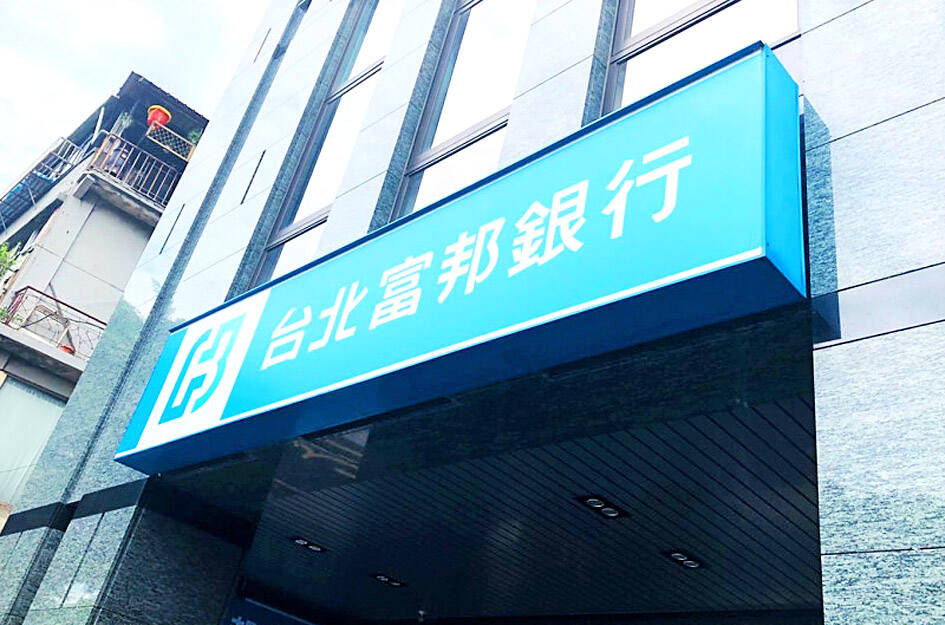Taipei Fubon Bank Co (台北富邦銀行) has secured approval from the Financial Supervisory Commission (FSC) to open a branch in Mumbai, India.
The FSC said in a statement yesterday that Taipei Fubon Bank — a subsidiary of Fubon Financial Holding Co (富邦金控) — had taken into account the Indian market’s current and long-term growth prospects before deciding to set up a branch in Mumbai.
The planned branch is expected to help Taiwanese investors in India and local Indian enterprises access financing opportunities, including international syndicated loans, it said.

Photo: Kelson Wang, Taipei Times
The commission therefore issued the green light to Taipei Fubon Bank to seek approval from financial authorities in India to open a branch in the Indian financial hub.
If successful, it would be the fourth Taiwanese bank to set up shop in India, it added.
So far, CTBC Bank (中國信託銀行) has two branches in India, one in New Delhi and the other in Sriperumbudur, while Bank of Taiwan (台灣銀行), the largest Taiwanese lender, and Mega International Commercial Bank (兆豐銀行) each have a representative office in Mumbai.
India is one of the 18 countries targeted by the government’s New Southbound Policy, which aims to enhance trade and exchanges between Taiwan and the 18 countries in Southeast and South Asia, as well as Australia and New Zealand, to reduce Taiwan’s dependence on China. It was introduced after President Tsai Ing-wen (蔡英文) took office in 2016.
As of the end of last month, Taipei Fubon Bank had overseas branches in Vietnam’s Ho Chi Minh City, Hanoi and Binh Duong, as well as in Hong Kong and Singapore, the FSC said, adding that the bank owns a subsidiary — Fubon Bank — in China.
In addition, it has representative offices in Jakarta, Indonesia, and Sydney, Australia.
Fubon Financial last month retained the title of most profitable financial institution in Taiwan after it posted a net profit of NT$14.07 billion (US$446.3 million), up 131 percent from a year earlier, with earnings per share of NT $10.8.
Taipei Fubon Bank also posted a new monthly high of almost NT$3.5 billion in net profit that month.

To many, Tatu City on the outskirts of Nairobi looks like a success. The first city entirely built by a private company to be operational in east Africa, with about 25,000 people living and working there, it accounts for about two-thirds of all foreign investment in Kenya. Its low-tax status has attracted more than 100 businesses including Heineken, coffee brand Dormans, and the biggest call-center and cold-chain transport firms in the region. However, to some local politicians, Tatu City has looked more like a target for extortion. A parade of governors have demanded land worth millions of dollars in exchange

An Indonesian animated movie is smashing regional box office records and could be set for wider success as it prepares to open beyond the Southeast Asian archipelago’s silver screens. Jumbo — a film based on the adventures of main character, Don, a large orphaned Indonesian boy facing bullying at school — last month became the highest-grossing Southeast Asian animated film, raking in more than US$8 million. Released at the end of March to coincide with the Eid holidays after the Islamic fasting month of Ramadan, the movie has hit 8 million ticket sales, the third-highest in Indonesian cinema history, Film

Taiwan Semiconductor Manufacturing Co’s (TSMC, 台積電) revenue jumped 48 percent last month, underscoring how electronics firms scrambled to acquire essential components before global tariffs took effect. The main chipmaker for Apple Inc and Nvidia Corp reported monthly sales of NT$349.6 billion (US$11.6 billion). That compares with the average analysts’ estimate for a 38 percent rise in second-quarter revenue. US President Donald Trump’s trade war is prompting economists to retool GDP forecasts worldwide, casting doubt over the outlook for everything from iPhone demand to computing and datacenter construction. However, TSMC — a barometer for global tech spending given its central role in the

Alchip Technologies Ltd (世芯), an application-specific integrated circuit (ASIC) designer specializing in server chips, expects revenue to decline this year due to sagging demand for 5-nanometer artificial intelligence (AI) chips from a North America-based major customer, a company executive said yesterday. That would be the first contraction in revenue for Alchip as it has been enjoying strong revenue growth over the past few years, benefiting from cloud-service providers’ moves to reduce dependence on Nvidia Corp’s expensive AI chips by building their own AI accelerator by outsourcing chip design. The 5-nanometer chip was supposed to be a new growth engine as the lifecycle